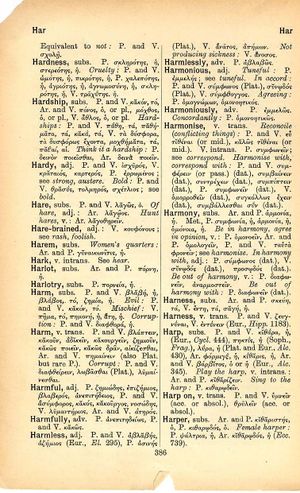hare: Difference between revisions
From LSJ
έγ', ὦ ταλαίπωρ', αὐτὸς ὧν χρείᾳ πάρει. τὰ πολλὰ γάρ τοι ῥήματ' ἢ τέρψαντά τι, ἢ δυσχεράναντ', ἢ κατοικτίσαντά πως, παρέσχε φωνὴν τοῖς ἀφωνήτοις τινά → Wretched brother, tell him what you need. A multitude of words can be pleasurable, burdensome, or they can arouse pity somehow — they give a kind of voice to the voiceless | Tell him yourself, poor brother, what it is you need! For abundance of words, bringing delight or being full of annoyance or pity, can sometimes lend a voice to those who are speechless.
(CSV4) |
m (Woodhouse1 replacement) |
||
| Line 1: | Line 1: | ||
{{Woodhouse1 | {{Woodhouse1 | ||
|Text=[[File:woodhouse_386.jpg|thumb|link={{filepath:woodhouse_386.jpg}}]] | |Text=[[File:woodhouse_386.jpg|thumb|link={{filepath:woodhouse_386.jpg}}]] | ||
P. and V. λαγῶς, ὁ. | ===substantive=== | ||
[[prose|P.]] and [[verse|V.]] [[λαγῶς]], ὁ. | |||
of [[hare]], adj.: [[Aristophanes|Ar.]] [[λαγῷος]]. | |||
[[hunt hares]], v.: [[Aristophanes|Ar.]] [[λαγοθηρεῖν]]. | |||
}} | }} | ||

